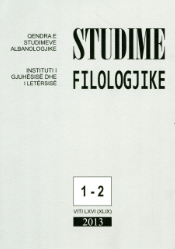SPIRO FLOQI PËR VALENCËN E FOLJEVE
SPIRO FLOQI ABOUT VERBAL VALENCE
Author(s): Thoma DhimaSubject(s): Language and Literature Studies
Published by: Qendra e Studimeve Albanologjike
Keywords: SPIRO FLOQI ; VERBAL VALENCE
Summary/Abstract: The Albanian linguist of the tradition Spiro Floqi conducted his activity in the years 50-80 of the last century. Ile distinguished himself especially in the field of syntax. He is among the first Albanian linguists who wrote about the the issue of verbal valence in the article “On the models ol' sentence in modern literary Albanian Philological studies, 1978/4. Based on the valence theory of L. Tesniëre, in a declarative sentence he distinguishes the necessary components or actants which are subject, objects, predicatives and the necessary adverbials, the facultative and unacceptable components. According to this he distinguishes necessary valences and possible, facultative ones. According to the necessary valences the verbs are divided into impersonal, intransitive, transitive and ditransitive. According to this concept the centre of the sentence is the verb. In the sentence he distinguishes also necessary adverbials: Close to the forrest lay the village. In today’s syntactic studies concerning Albanian the issue whether the necessary adverbials are actants (arguments) of the verb is debatable (controversial). I oday’s tendency is to increase the role of these arguments, considering as such every necessary member of the verb. The adverbials express circumstances and they are indeed necessary, but they are not included in the actants, which express the essence of the process. The necessary adverbials in the sentence in our studies are not considered as arguments, but this goes against the theory of Tesniëre. For the constructions with the preposition nga “by” with a verb in the passive: Skela ishte hapur nga Xheladin heu “The pier had been opened by Xheladin bej”, Floqi thinks that objective relationships are expressed when the name denotes a person, when it is a concrete or abstract name, in the majority of the cases it is an adverbial. To come with up a decision as to the function of the constructions with the preposition nga, if they are prepositional indirect objects or adverbials we should proceed from the valence of the verbs. When the construction with nga satisfies one of the valences of the verbs, it is an object, otherwise it is an adverbial when other elements of the sentence satisfy the valence of the verb. In the article are given constructions with nga + noun and their function, if they are objects or adverbials.
Journal: Studime Filologjike
- Issue Year: 2013
- Issue No: 01-02
- Page Range: 053-061
- Page Count: 9
- Language: Albanian

